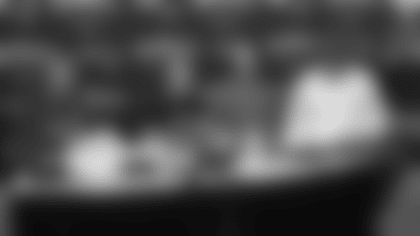HEAD COACH BILL BELICHICK
Conference Call
Tuesday, November 19, 2019
Q: How prevalent is Rod Marinelli's defensive scheme in the NFL now, and how has that shifted from what you used to see in the league five or 10 years ago?
BB: Well, I think that scheme has remained in the league. It just depends on who the head coach or who the coordinator is that's running it. I think there are definitely some similarities to the Seattle 3 scheme from a front standpoint, not so much from a coverage standpoint. The coverage element is a little bit different, but it's still heavy zone-based. But yeah, it's still there. Certainly, we saw a lot of it when [Tony] Dungy was in Indianapolis, and there are other teams that use it and certainly there are elements of it. I mean, there are a lot of teams that use the Tampa 2 coverage, and even some of the Seattle 3 teams that started incorporating that, but maybe not necessarily with the same over-front that the Cowboys like. But, the Cowboys get into some different looks on third down, and it's not exclusive to that, but it's based on that, certainly. And I don't think Coach Marinelli has changed too much fundamentally from where he was 20-some years ago in Tampa, and then Detroit and so forth. I'm sure the fundamentals, which is the most important part of the defense, I'm sure those are the same.
Q: When you describe how the Cowboys established their sustained success in the past, it may be as easy as saying, "Gil Brandt," which you have touched on in the past. With the Patriots, it may not be that simple. How would you describe that personnel structure with the Patriots? Where did that come from?
BB: Yeah, I'd say Cleveland. I mean, obviously it's different, but it's a variation of what we did in Cleveland.
Q: What is unique about Dak Prescott and Ezekiel Elliott as a Quarterback-Running Back tandem?
BB: I mean, they're both really good. You can put [Tony] Pollard in there, too. He's a really good back, too. So, whichever back's in the game is a problem. Prescott's a problem. They're all good, and they're just hard to deal with. Prescott can obviously run, but he throws a lot more than he runs, and threw for almost 450 yards last week. So, he does a good job reading coverages, accurate at all three levels of the defense, finds the right matchups in the passing game. They have a good scheme; they obviously have good players. They have a good quarterback, they have a good offensive line – so, it's all a problem – and the backs are good, same thing. They have a good offensive line, they block well. The backs run well; they're involved in the passing game, too, so you can't ignore them in the passing game. They can kill you there. They're well-coached. They have a good scheme, so if you take one thing away, they'll kill you with something else. They lead the league in third-down conversions, that all comes down to good players, good execution and a good plan. They have all of them.
Q: Have you or your scouting department tracked Dak's development through Mississippi State and into his first few years in the NFL?
BB: Well, we evaluate players, but a player like that is not somebody we'd spent an inordinate amount of time on, simply for the fact that we don't play them very often and he's not available. So, he's in a rookie contract. He's going to play through the rookie contract and probably a lot longer than that. But, it's not a player that you anticipate being on the market anytime soon, so you wouldn't spend a lot of time evaluating him. So, we track the guys that we play, or players that we think may become a factor, potentially, in some capacity, and he doesn't fall into either one of those categories. I mean, we do it, but not at the same level we would do other players.
Q: Their defense gets to the quarterback quite a bit. Is that a function of their scheme or personnel with DeMarcus Lawrence and others? What do they do to get to the quarterback as much as they do?
BB: All of the above. Again, they're really good at it; they're good at everything. They have a lot of players – I mean, Lawrence is a great player, [Robert] Quinn's a great player – but, they have a lot of guys. [Maliek] Collins is a problem. Certainly, when they use [Jaylon] Smith, he's a problem. They use him when they sub-rush a lot. [Kerry] Hyde, [Dorance] Armstrong, [Leighton] Vander Esch – those guys can all be used a little bit differently, especially on third down. But, they're a very fast and explosive and athletic group that has good pass rush techniques, which Rod is obviously one of the best pass rush coaches in the league and has been. So, the get-off, their pad level, their hand-use, their pass rush techniques, games, are all done at a very high level with very good players, and multiple players. So, there are some scheme issues, but they're hard to block and it's hard to help because you just don't have enough guys. There are too many good rushers, too many good players. So, third down is the biggest problem, but really, every down is a problem. If you just, technique-wise, do something a little bit wrong, set a little bit wrong, or are just a little bit late off the ball, or they get a good jump on the ball, or you're in play-action pass, and it just kind of matches up that they're not going straight ahead – maybe they're moving laterally a little bit one way or the other because they have a stunt called – then you can get into a situation where they catch an edge or catch a gap on you, and they can do a lot of damage there, too. So, the players are a problem, the schemes are a problem, and the number of different players they use. Each guy's a little bit different to block, but they're all good. So, that's all a problem.
Q: What are your thoughts on Nick Folk and Benjamin Watson over the past couple weeks? It seems like they've been getting more and more comfortable.
BB: I think you put it well, Mike [Reiss]. You know, Folk's done a good job for us. He only has a few opportunities in a game, like all kickers do, but he's shown a good level of performance and dependability. We've seen that in practice as well, consistency. So, he's been good there. He's worked well with Jake [Bailey] and Joe [Cardona], and I think that operation is improving. I mean, I wouldn't say we're there yet, but it's improving and it's been productive. And Ben Watson's been kind of the same thing. He missed several weeks of football there: a couple weeks at the end of the preseason, and then a few weeks during the start of the regular season. So, there was some time there, but Ben's a smart guy. He works hard, he has a lot of experience, and he's been able to be productive for us as well and in a higher volume of snaps. So, we're fortunate that we have those two players, and they've done a good job for us.
OFFENSIVE COORDINATOR JOSH MCDANIELS
Conference Call
Tuesday, November 19, 2019
Q: What kind of problem does Leighton Vander Esch present to the offense?
JM: Their whole front seven is a problem. They have – they play well together within the scheme, Kris [Richard] and Rod [Marinelli] have really done a great job of putting these guys in positions to utilize their strengths. The linebackers – you know, Vander Esch runs well, really well, [Jaylon] Smith runs very well, [Sean] Lee runs well. They can all run you down if you're going side-to-side too much. They work well with the front when they stunt and move the front to cancel gaps and create opportunities for the linebackers to be free tacklers. They're all good tacklers, when they see gaps and can create negative plays in the running game by running free when they see an opportunity, and they're all fast enough to get there and get to the back before somebody can come off. And then they're timely. They're a blitz team. They'll stick them in every once in a while and these guys are all a little squirrelly when they blitz and they're not easy to make solid contact with. So, I think it's a really, really good group. The front's very disruptive. Vander Esch, Smith, Lee – these guys have all made negative plays and run backs down and make tackles at the line of scrimmage or tackles for loss and they play extremely well together. They know exactly where the front is going to go and what they're going to do and they fit perfectly off of them. It's a unique style of defense, we've seen it a little bit here and there. Certainly with Matt Eberflus in Indy last year, we saw that a little bit, too. This is a big challenge. You've got three days to practice and get ready for this different type of style and speed in the front, and looking forward to getting started with our guys tomorrow.
Q: Is there any carryover effect from when the Cowboys faced the Lions last week, if you see how Detroit approached it and you're familiar with Matt Patricia?
JM: You're talking about Detroit's offense?
Q: Yes, going up against the Dallas defense.
JM: Yeah, I mean, we've studied all the film. Certainly the Detroit game was in our study, so we've studied all the film. The most important thing you can do is try to understand how they play, how they play their defense, how they utilize their personnel, and then figure out what the best fit for your team is. Our team isn't the same as most other teams, which I would say – everybody would say that about themselves. So, you look and you take some things here and there from each game that may catch your eye or you may feel like fits your personnel and your scheme and your system and try to put the best plan you can in place and give our guys the best chance to be successful on Sunday.
Q: What is your general assessment of the screen game and how effective it has been? What is the challenge of developing a consistent screen game when you have a lot of moving pieces?
JM: We've certainly made a fair chunk of plays with that part of our offense and there's a lot of things you've got to do right to have effective screens. But there's also some potential unseen benefit from utilizing them periodically during the course of the game to maybe slow down a rush, or you start getting the defense to think about them a little bit and that may pay some dividends for you as the game goes along. We work really hard at our screens. We looked at them during the course of the bye week there and evaluated that part of our offense, as we did every other part. Screens are generally a play where you feel like you can get the ball in somebody's hand and have an opportunity to create a space play for them. There's always things we can do better. Certainly, we had a couple good ones the other night, then we had some that weren't as good as what we would have liked them to be. But, Philly had an aggressive rush style and an aggressive unit up front that tries to get to the quarterback. When you call a screen, the one thing you know is there's not five guys in the pattern. You know, you have one guy to throw it to, generally, and so you cut down on your options there. You're counting on the defense to rush, you're counting on your execution to not only complete the ball but then to get to people out in front of the runner and make some blocks down the field and create some space for them to make some yards. I thought Sony [Michel] had a good one the other night. I thought Rex [Burkhead] made a heck of a play on one. We had a couple others that we would have liked to do more with. By and large, you call them for multiple purposes – one to get the ball in a player's hands that can do some things with them in space, and two to maybe possibly slow down the rush, and generally they're a low-risk play. Hopefully you can make something with them when you call them.
Q: What is your assessment of Ben Watson since he has come back to play?
JM: Ben is a pro. He puts in all the time and effort and work to be prepared for the opponent, to prepare his body for the things that we need to do during the course of the week, to be really ready to play each week. You really appreciate that part of him. He's a guy that's made some plays for us in the passing game. He's done some things on the edge – chipping and blocking things in the running game, too. He serves a lot of purposes for us. He's a guy that knows how to play in our system and in our offensive scheme. We have a lot of trust and faith in him – practices hard, competes well every day and really is a good influence on all our guys in terms of knowing how to prepare and getting ready each week. Made some big plays for us the other night, and we'll look forward to continue to work to improve our entire group and I'm sure Ben will do a great job with that, as well.
Q: You can tell that Tom Brady is frustrated with the level of performance from the offense. As someone who is around him every day, do you talk to him and try to keep his spirits up?
JM: I can't comment exactly on his frame of mind, I just know that he's a competitive guy. We have a lot of competitive guys on our team and we all want to do our best. We have one goal when we go out there on the field every time we have the ball on offense, and that's to score. When you don't do as well as you'd like to do, you can understand that they're – personally or collectively as a unit – you're frustrated with your output, but at the same time, understanding in the big picture our No. 1 goal and the most important thing for all of us is to contribute to wins. I think there was many things the other day that we did that helped contribute to that, and there were certainly things that we did that we want to do better going forward. I've been with Tom a long time and I appreciate his competitive spirit, his desire to be perfect in everything he does and with everything that our unit does. I don't ever take that as a negative. I understand he wants to go out there and do what we all do which is to put a lot of points on the board every week. I talk to him frequently. We've had games where we've scored 40 points and we haven't been real happy either because there's certain things that we didn't do as well. Our goal right now is to keep getting better and try to improve. Look, this is my responsibility and I certainly want to look at what I'm doing first and try to figure out what I can do better to try to help put our players in position to be successful each week. That's what my job is and I'm going to do the best I can at doing that, and I know our guys have a great attitude and approach each week. We continue to try to work hard in practice to improve to eventually play our best football, which we haven't played yet. There's a lot of things we can do better, and like I said, I'm going to start with myself and figure out what I can do to make a positive difference for us as we move forward in a lot of areas offensively that we can improve and be better in.
Q: Have you had to mute your offense a little bit because of the youth at the wide receiver and tight end positions and experience level?
JM: I think that the No. 1 thing you have to do right with your team in order to allow them to play the best they can play in the unit is to understand where your group is at collectively. It doesn't matter what I want to do or what somebody else wants to do; what matters is what we can do well. We have to continue to identify those things on a weekly basis, because it's not the same each week either. The challenge is different based on the defensive personnel, the defensive scheme, the way they utilize their players, the matchups that we're going to have week-in and week-out. So, there's differences there, as well. It's a continuation each week that you evaluate your group and what you can do schematically versus their group and what they do schematically and try to identify the best ways to do that. Again, my expectations this week are that we put together the best plan we can and then go out there and work as hard as we possibly can to get it right in practice so we can go out and play fast and aggressive and the guys can do their jobs well on Sunday. Where we're at on the spectrum of all that stuff, I don't really spend a lot of time thinking about that. I know my job is to try to figure out what every guy can go out there and do well together, collectively, when the 11 guys that are out there on the field are out there together. Sometimes, there might be less that we can do, but we do the other things better and sometimes you can do more. Like I said, there's a lot of decisions that go in to that and a lot of things that factor into those decisions each week. Again, like I said, it's my job to try to figure out how to blend that all together. Our staff is working really hard and diligently on trying to do that, as well. I know our guys are going to have a great attitude and approach this week to try to improve, and our goal is to try to play our best football as we head down the stretch here.
Q: What are your impressions of N'Keal Harry and how do you feel he did in his debut?
JM: It was good to get him out there and into the game. I thought he was ready to play. He had a good week of practice last week. In any rookie's first opportunity to play in the National Football League, there's probably going to be some good and then some things to work on and that you learn from those experiences in the game. There's no way you can simulate that in practice or walk-throughs or what have you. So, to go in there in a game and compete against other players in that type of situation under pressure, I think it's a great experience and great exposure for him. He made a few catches for us and helped us move the ball. He tried to block in the running game effectively and did a decent job there, and at the same time there's definitely things that we've been able to see through the film that we'll improve on and he'll work towards being better at as we go forward. Every rookie starts at the same spot when you're going out there for your first time – you're excited to play, you're eager to go out there and help your team make an impact. I thought he did some good things, and there's definitely some things that we'll be able to work on going forward to make N'Keal a better player and help our offense even more.
CORNERBACKS COACH MIKE PELLEGRINO
Conference Call
Tuesday, November 19, 2019
Q: Even though the interception call was overturned on Sunday, Jonathan Jones made an aggressive play on the ball. When you're going back on film with the coaching staff and players, how much of that is a teaching moment in terms of that being how you want to see your cornerbacks compete?
MP: Yes, there's a lot to teach off of that play, leading up to the actual throw – positioning, alignment, stuff like that. But, that's Jon in a nutshell right there at the end of the play. He's a gritty guy, loves to compete. I'm not surprised that he would make that effort to make that play.
Q: Did the coaching staff get any explanation as to whether or not it was a 50-50 ball still on the ground or what the explanation was from the officiating crew, if you're aware of it?
MP: I believe Bill [Belichick] gave explanation on the call. But, just from my perspective, it is what it is. The officials made the call, New York overturned it – you know, it is what it is. Just got to work through it and just keep playing.
Q: With the perspective of coaching Stephon Gilmore on a day-to-day basis, what do you think makes him one of the top players in the league at his position?
MP: Good question. Working with Steph every day is awesome. I'm blessed to do it. What makes him elite? I've said this before, I'll say it again – his preparation and dedication to the game is remarkable. He comes in every single day, his film study and the way he competes in practice is second to none. The guy comes in every single day, doesn't let anybody catch a pass on him. It's fun to watch him play.
Q: What stands out to you about his physical skillset?
MP: Steph's a bigger corner, but he moves well. That skillset that he has is pretty elite.
Q: Can you explain how unique or uncommon it is for a cornerback to travel, whether it's right side, left side, go inside in the slot or play outside on the boundary? Gilmore seems able to do all those things, while also being versatile enough to defend a wide receiver or a tight end. How uncommon are those traits and how special do they make a player?
MP: I would say, in my short coaching career, I'm pretty spoiled to have a guy who is able to do all that. I haven't been doing this forever. So, I would say it's pretty unique to have a guy to be able to do that and have the versatility. Again, like I said before, incredibly blessed to have him on the team, but it's also a compliment to the guys who work around him to make it a team effort. Steph does so much on his own, but the guys around him also do a great job – Jason McCourty, Jon Jones, JC Jackson, Devin McCourty, Duron Harmon, T-Brooks [Terrence Brooks] and Pat Chung. You know, one guy just can't go out there and do it by himself. They need to go out there and work together. So, I think with his skillset, along with the guys that work around him, make it so that we can be able to do things like this.
Q: You mentioned Terrence Brooks and Jon Jones. Those are two guys who spent the early part of their careers playing a lot of special teams. How much does that help in open-field tackling? Do you see signs in their development on defense that special teams has helped them?
MP: Yeah, so anytime you can improve your tackling and be a good tackler, there's a spot for you to play on defense, almost on any team. Just for those guys, special teams is how they got to the game younger in their career, earlier in their career, but I'd say they were guys just chomping at the bit to actually get on the field and show what they could do. Now they're given that opportunity to get out there and go do it, and I couldn't be happier for both those guys, actually.
Q: How much this year do the safety and cornerback rooms share information when going up against a passing attack like the one you'll be facing Sunday against Dallas?
MP: Well, there's one room, so that's just how we work. But, yeah, on Sunday going against Dallas, these guys can keep you up at night. We've got [Amari] Cooper, [Randall] Cobb, [Michael] Gallup and then you've got [Tavon] Austin. Starting with the coaching staff over there, they've done a great job with these guys – the OC, [Kellen] Moore, and the wide receiver coach, Sanjay [Lal]. You can see on tape that these guys are coached well, they play hard. I mean, as you can see by the stats, too – No. 1 total yards per game, No. 1 on third down, No. 2 in explosive pass plays and No. 2 in passing yards per game. We've got our work cut out for us this week and we're excited for the opportunity to go against these guys. It should be a good challenge for us.
Q: We've seen Justin Bethel make an impact on special teams, but how is he progressing on defense?
MP: Everyone on this defense has a role, whether you're a special teams guy or a defensive guy. Most guys have crossover. Justin has a role – got an opportunity to go out there in the game on Sunday, did well, incredibly excited for him to get more opportunities moving forward here. So, keep you updated on that one.









































